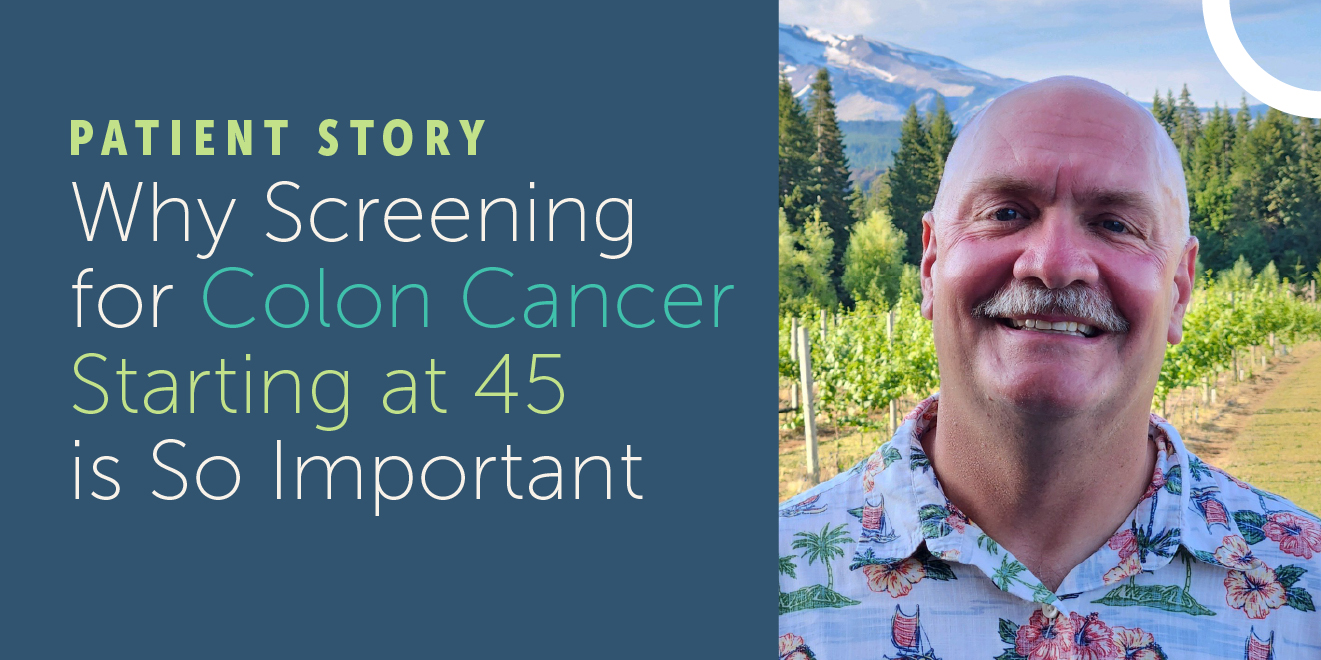
Brent, a patient of The Oregon Clinic gastroenterologist Dr. Branden Tarlow, underwent his first screening colonoscopy last year at age 47. He shares his story with us below to help spread awareness and encourage others to screened for colon cancer.
Colon cancer is one of the most common and deadly cancers in the US. Thankfully, it is one of the few cancers that can be prevented. And, if caught early, can be treated. The key to staying healthy is getting screened at the right time.
“I have had regular dentist appointments that were worse than the colonoscopy! You prep, go under, wake up, get your results, and leave.”
Brent, a patient at The Oregon Clinic Gastroenterology East
Brent’s Story
After experiencing a flare up of diverticulitis, an inflammation of the colon, Brent’s primary care provider referred him to Dr. Tarlow at The Oregon Clinic Gastroenterology East. Because of his medical history, a colonoscopy had previously been recommended but Brent missed it due to pandemic-related delays.
In December 2023, Brent went in for his colonoscopy with Dr. Tarlow. “Dr. Tarlow was very professional. I felt as though he cared about me as a person and not just another patient.” Brent found that the procedure went very smoothly. “I have had regular dentist appointments that were worse than the colonoscopy!” Brent says. “You prep, go under, wake up, get your results, and leave.”
After reviewing Brent’s colonoscopy results, Dr. Tarlow let him know about a potential issue that he had addressed immediately during the procedure. Dr. Tarlow then put together a plan to continue to follow up and monitor Brent’s health following the procedure. “Dr. Tarlow continued to make sure I was checked further with additional tests and procedures until he and his team believed I was clear until my next colonoscopy,” Brent says.”
Based on the results of his colonoscopy, Dr. Tarlow recommended that Brent undergo genetic testing, a medical test that looks for changes in chromosomes, genes or proteins that are linked to cancer. Some cancers, such as colon, breast, and ovarian, occur more often in family lines and genetic testing can help determine if earlier screening is necessary. “Getting a screening for yourself also helps your family”, says Dr. Tarlow. “Because of their shared family history, Brent encouraged his brother to start screening earlier.”
Importance of Getting Screened
“Making the decision to get the colonoscopy may have saved my life,” Brent says. He feels assured and grateful he had his colonoscopy to help prevent future illness.
Before his visit, Brent was unaware that the recommended screening age had been lowered. Brent shares his story in the hopes that it will encourage others to get screened beginning at age 45. In 2021, in response to the rising rate of colon cancer in younger adults, the United States Preventative Task Force released new guidelines lowering the screening age for colon cancer from age 50 to 45.
“I know that colonoscopies are a bit invasive, and we all might be a little embarrassed by it, but they are no joke. It’s a small price for what could be a huge deal,” he says. “If the doctor finds nothing, great. If he does discover something, then you will be very glad it was found and will be dealt with. Schedule an appointment when appropriate and do not wait. Get the procedure done! There is no reason to put it off.”
Why Choose Colonoscopy?
Colonoscopy remains the gold standard for colon cancer screening because it’s the only test that detects and allows for removal of polyps at the same time. Not all polyps turn into cancer, but all cancers start as polyps. Polyp removal prevents colon cancer before it can start! If you have a personal history of polyps, colon cancer or family history of colon cancer, colonoscopy is the only recommended test.
The Oregon Clinic has many gastroenterology experts who provide the highest quality care. Click here to learn more about colonoscopies, what to expect, and to schedule your screening appointment. It could save your life.